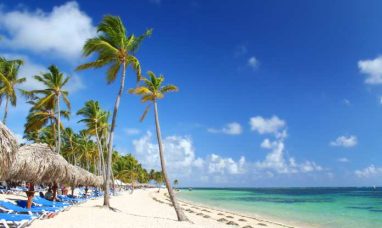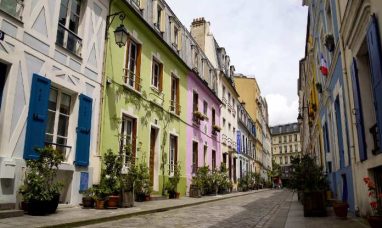DUBLIN, Jan. 3, 2024 /PRNewswire/ — The “Global Luxury Travel Market Report by Type of Tour, Age Group, Type of Traveller, and Region 2023-2028” report has been added to ResearchAndMarkets.com’s offering.

The global luxury travel market size reached US$ 2,049.2 Billion in 2022. Looking forward, the market is expected to reach US$ 2,683.9 Billion by 2028, exhibiting a growth rate (CAGR) of 4.60% during 2022-2028
The rising demand for exclusive and personalized travel experiences, expanding high-net-worth individual (HNWI) population seeking luxury travel options, and increasing focus on wellness and sustainability in luxury travel offerings are some of the major factors propelling the market.
Europe held the biggest share in the market since the region is home to an array of iconic and culturally rich destinations, from the historical cities of Rome, Paris, and Prague to the scenic beauty of the Swiss Alps and the Mediterranean coast, offering a diverse range of luxury experiences. Apart from this, Europe boasts a long history of luxury hospitality, with its heritage luxury hotels and boutique properties, providing travelers with opulent accommodations and impeccable service.
Moreover, rising emphasis of the region on gastronomy and fine dining attracts luxury travelers seeking culinary excellence, with numerous Michelin-starred restaurants and local gourmet experiences. Furthermore, Europe’s efficient transportation infrastructure and access to exclusive cultural events, from fashion shows to art exhibitions, enhance its appeal to luxury travelers.
Additionally, Europe’s commitment to sustainability and responsible tourism aligns with the values of eco-conscious luxury travelers, ensuring that the region continues to lead the way in delivering high-end, sustainable travel experiences that resonate with the evolving preferences of affluent global travelers.
Competitive Landscape
The market is experiencing steady growth as key players are continually innovating to meet the evolving preferences of discerning travelers. Recent innovations include the integration of advanced technology to enhance the booking and travel experience, with virtual reality (VR) and augmented reality (AR) being used to provide immersive previews of accommodations and destinations. Additionally, there is a growing focus on sustainability, with luxury hotels and resorts adopting eco-friendly practices and designing carbon-neutral properties to cater to environmentally conscious travelers.
Personalization remains a key trend, with luxury travel providers leveraging data analytics and artificial intelligence (AI) to curate bespoke itineraries and offer highly tailored services. Furthermore, luxury cruise lines are introducing cutting-edge amenities such as underwater lounges and sustainable ship designs. These innovations collectively aim to elevate the luxury travel experience, providing travelers with unique, sustainable, and personalized journeys that align with their values and preferences.
Luxury Travel Market Trends/Drivers
Growing affluence of high-net-worth individuals (HNAWIs)
The increasing affluence of high-net-worth individuals (HNWIs) and affluent consumers is a primary driving force behind the luxury travel market’s expansion. As economies grow and prosperity spreads globally, more individuals are gaining access to higher disposable incomes, enabling them to indulge in luxury travel experiences.
This demographic seeks exclusivity, comfort, and premium services when exploring the world. They are willing to invest in opulent accommodations, private transportation, and curated itineraries that cater to their preferences. The luxury travel industry capitalizes on this trend by continuously innovating and offering top-notch services to meet the discerning tastes of affluent travelers. This growing affluence fuels demand for luxury travel and encourages the development of new destinations and experiences that cater to the evolving desires of this segment.
Rising desire for unique experiences
Luxury travelers today are not satisfied with mere comfort; they seek meaningful and distinctive experiences that set their journeys apart. This driver has led to the rise of experiential luxury travel, where travelers immerse themselves in local cultures, traditions, and landscapes. They opt for bespoke itineraries that cater to their interests, from culinary adventures and private art tours to wildlife safaris and wellness retreats.
The desire for unique experiences has given rise to a trend where luxury travel becomes a form of self-expression, allowing travelers to collect memories and stories that differentiate them from conventional tourists. The luxury travel industry responds by providing exclusive access to hidden gems, private guides, and off-the-beaten-path adventures, ensuring that each journey is a one-of-a-kind experience tailored to individual preferences.
Increasing sustainability and wellness consciousness
Sustainability and wellness have emerged as crucial drivers in the luxury travel market. As travelers become more socially and environmentally conscious, they seek accommodations and experiences that align with their values. Luxury travelers now expect eco-friendly practices, responsible tourism, and sustainable accommodations, which include everything from eco-lodges in remote natural settings to sustainable cruises that minimize environmental impact.
Additionally, the wellness aspect of luxury travel emphasizes physical and mental well-being, with travelers seeking spas, fitness centers, meditation retreats, and nutrition-focused experiences during their trips. The luxury travel industry recognizes these trends and is incorporating sustainable and wellness-focused offerings into its portfolio, ensuring that travelers can enjoy guilt-free luxury experiences that promote both personal well-being and environmental responsibility.
This shift is an ethical choice and a competitive advantage for luxury travel providers, as it meets the evolving preferences of a socially conscious and health-focused clientele.
Luxury Travel Industry Segmentation
Breakup by Type of Tour:
- Customized and Private Vacation
- Adventure and Safari
- Cruise and Ship Expedition
- Small Group Journey
- Celebration and Special Event
- Culinary Travel and Shopping
- Adventure and safari hold the largest market share
Breakup by Age Group:
- Millennial (21-30)
- Generation X (31-40)
- Baby Boomers (41-60)
- Silver Hair (60 and above)
- Baby boomers (41-60) represents the leading age group segment
Breakup by Type of Traveller:
- Absolute Luxury
- Aspiring Luxury
- Accessible Luxury
- Absolute luxury is the most popular type of traveler
Breakup by Region:
- North America
- United States
- Canada
- Asia-Pacific
- China
- Japan
- India
- South Korea
- Australia
- Indonesia
- Europe
- Germany
- France
- United Kingdom
- Italy
- Spain
- Russia
- Latin America
- Brazil
- Mexico
- Middle East and Africa
Some of the key players in the market include:
- Abercrombie & Kent USA LLC.
- Butterfield & Robinson Inc.
- Cox & Kings Ltd.
- Exodus Travels Limited (Travelopia)
- Kensington Tours Ltd.
- Micato Safaris
- Scott Dunn Ltd.
- Tauck
- Thomascook.in (Fairbridge Capital (Mauritius) Limited)
- TUI Group
For more information about this report visit https://www.researchandmarkets.com/r/glmoo4
About ResearchAndMarkets.com
ResearchAndMarkets.com is the world’s leading source for international market research reports and market data. We provide you with the latest data on international and regional markets, key industries, the top companies, new products and the latest trends.
Media Contact:
Research and Markets
Laura Wood, Senior Manager
[email protected]
For E.S.T Office Hours Call +1-917-300-0470
For U.S./CAN Toll Free Call +1-800-526-8630
For GMT Office Hours Call +353-1-416-8900
U.S. Fax: 646-607-1907
Fax (outside U.S.): +353-1-481-1716
![]() View original content:https://www.prnewswire.com/news-releases/global-luxury-travel-market-report-2023-2028-analysis-by-type-of-tour-age-group-type-of-traveller-and-region-302025468.html
View original content:https://www.prnewswire.com/news-releases/global-luxury-travel-market-report-2023-2028-analysis-by-type-of-tour-age-group-type-of-traveller-and-region-302025468.html
SOURCE Research and Markets

Featured image: Megapixl © Kgphoto





